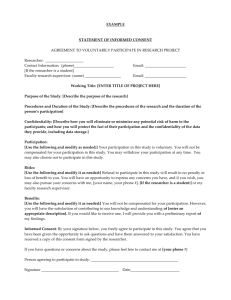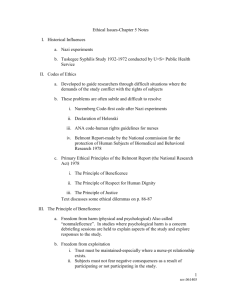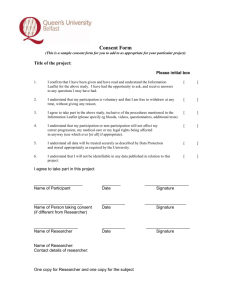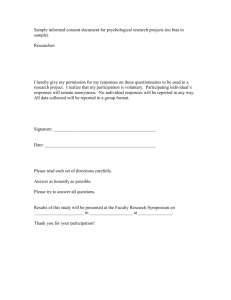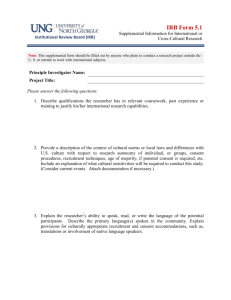teaching criminal justice research ethics through a classroom
advertisement
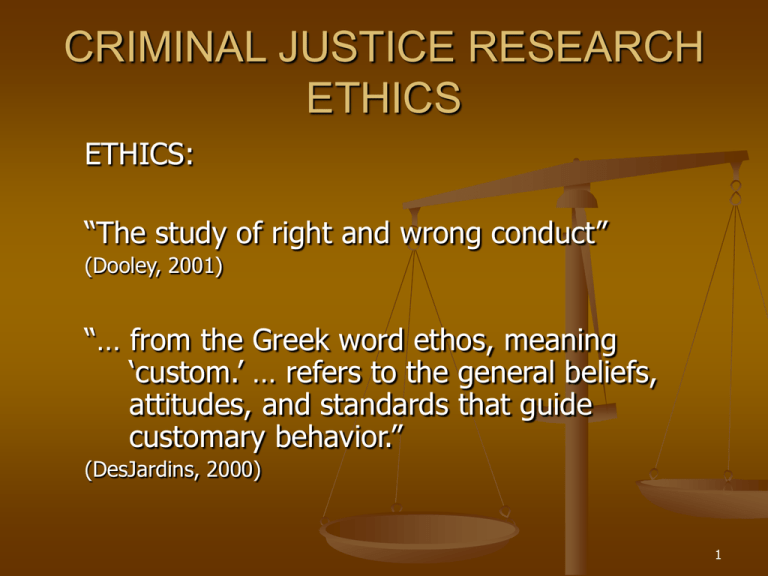
CRIMINAL JUSTICE RESEARCH ETHICS ETHICS: “The study of right and wrong conduct” (Dooley, 2001) “… from the Greek word ethos, meaning ‘custom.’ … refers to the general beliefs, attitudes, and standards that guide customary behavior.” (DesJardins, 2000) 1 CRIMINAL JUSTICE RESEARCH ETHICS ETHICAL CRIMINAL JUSTICE RESEARCH: A THREE-LEGGED STOOL 1. Identify intellectual and social contributions of a research study 2. Protect the rights of human subjects 3. Ensure ethical researcher conduct 2 IMPORTANCE OF TEACHING ETHICAL RESEARCH SKILLS 1. Focus & Impact of Criminal Justice Research Implementation & Effectiveness of Laws, Policies, Programs, Law Enforcement Tactics Multiple Populations Impacted: Offenders, Potential Offenders, CJ Practitioners, General Public 3 IMPORTANCE OF TEACHING ETHICAL RESEARCH SKILLS 2. Vulnerable Populations Involved in Criminal Justice Research Incarcerated Offenders Juveniles Mentally Ill 4 IMPORTANCE OF TEACHING ETHICAL RESEARCH SKILLS 3. Sensitive Data & Confidentiality Criminal History Information Current Offending Patterns Gang Involvement Substance Abuse Habits Recollection of Emotionally Disturbing Experiences 5 HISTORY Nuremberg Code Professional Association Guidelines ASC, WSC, ASA, APA Tuskegee Syphilis Study Fruitful results Voluntary Consent No unnecessary physical or mental harm Freedom to stop participation Macon County, Alabama, 1929 U.S. Dept. of Health & Human Services guidelines for human subject research, 1981 Institutional Review Boards (IRB) 6 Institutional Review Boards Composed of researchers’ colleagues & members of community Required in institutions that receive federal research funds Prisoner / Offender rep. for CJ research Universities, hospitals, RAND Corp., state agencies All research involving human subjects must be approved PRIOR to start of study 7 Protecting Human Subjects & Proper Researcher Conduct Protecting Human Subjects Potential Problems: Physical / Psychological Harm Damage to Reputation Lack of Confidentiality Loss of Privacy, Retaliation Expense & Inconvenience 8 Protecting Human Subjects & Proper Researcher Conduct Protecting Human Subjects Protections: INFORMED CONSENT Voluntary written consent to participate Confidentiality / Anonymity of Records Maintenance of Privacy IRB Approval 9 Protecting Human Subjects & Proper Researcher Conduct Protecting Human Subjects Rights of Research Participants: Informed Consent Protection from psychological or physical harm Freedom to stop participation at ANY time Confidentiality Debriefing Expectation of meaningful research results 10 Protecting Human Subjects & Proper Researcher Conduct Proper Researcher Conduct Potential Problems: Harm to subjects Plagiarism Fraud Waste Private v. Public Interest 11 Protecting Human Subjects & Proper Researcher Conduct Proper Researcher Conduct Enforcement & Sanctioning Professional Associations Deny publication, Issue public reprimand, Cancel membership Government Withhold funds (individual or institution) Rarely… Impose fines, Bring criminal charges Research Subjects Complain to IRB / Association, Civil Complaint Public Media Expose Story 12
